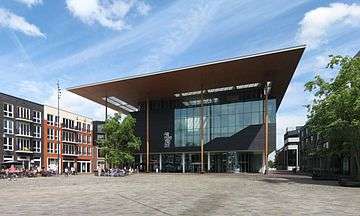Hubert-Jan Henket
Hubert-Jan Henket (born 11 March 1940, Heerlen) is a Dutch architect. He is a specialist in the relations between old and new buildings, the redesign of buildings, renovation and restoration.
Life
Henket graduated in 1969 cum laude in civil engineering from the Technische Hogeschool Delft (Delft Technical University) where he was taught by Jaap Bakema and Aldo van Eyck. In 1969-1970 he was given a grant by the Finnish government to study urbanism at the technical university of Helsinki, Teknillinen korkeakoulu. He worked with the Finnish architect Reima Pietilä between 1971 and 1974 for the London architect company Castle Park Dean Hook architects. Acting for the company, he was director of the Housing Renewal Unit in London from 1974 until 1976. In 1976 Henket started his own architectural practise, "Henket & partners architecten". In 2000 he joined forces with Janneke Bierman to form "Bierman Henket architecten".
When he started working in London, Henket began teaching, starting at The Bartlett, the civil engineering faculty of University College London. After that he became "wetenschappelijk hoofdmedewerker" (scientific staff member) in renovation technique at the Technische Hogeschool Delft. Between 1984 and 1998 he was professor in engineering at the Technische Universiteit Eindhoven (Technical University Eindhoven), and from 1998 until his retirement in 2005 he was professor in Delft. Although retired, Henket is still active as architect at his own company, located in Esch, Netherlands.
In 1988 Henket and Wessel de Jonge founded the Docomomo International foundation, which tries to further the document and preserve buildings, landscapes and neighborhoods of the modernist movement. The organization has chapters in more than 40 countries. Henket is the honorary chairman of the organization. In 1999 the Dutch documentary series Uur van de Wolf, broadcast the documentary Hubert-Jan Henket, man van staal, hout en glas (Hubert-Jan Henket, man of steel, wood and glass).
Work

With his company, he is (jointly) responsible for, amongst others, the new wing of the Teylers Museum in Haarlem, the design of the De Vriese Paviljoen of the Museum Boijmans van Beuningen in Rotterdam, the Art Centre of the Verkadefabriek in 's-Hertogenbosch, the new section of the Museum Catharijneconvent in Utrecht and the Winter Garden of the Hortus botanicus in Leiden.
He was also (amongst others) involved with the renovation of the Institute for Deaf people in Sint Michielsgestel, the Singer Museum in Laren, the Mary Chapel of the St. John's Cathedral in 's-Hertogenbosch and Sanatorium Zonnestraal in Hilversum (together with Wessel de Jonge architecten).
The company was also among those involved in major contracts like the new sections of the Rijksmuseum Amsterdam, the Stedelijk Museum in Amsterdam and as supervisor architecture and urbanism of (amongst others) Airport Schiphol, Hart van Zuid and Hengelo.
Recognition
In 1999 Henket won the Prins Bernhard Cultuurfonds Prize for his oeuvre. In 2003 he was appointed a Knight in the Orde van de Nederlandse Leeuw (Order of the Dutch Lion). In 2004 he and Wessel de Jonge won the BNA Kubus, a prize of the Dutch Federation of Architects because of their revitalization of architectonic heritage. Henket also won the Victor de Steursprijs, Scheudersprijs for subterranean building and the Bouwprijs 2005. In 2007 the Fries Museum in Leeuwarden and the Glaspaleis in Heerlen honored him with an exhibition of his work. In 2015 he was made an Honorary Fellow of the RIAI.[1]
Publications
- Bouwen is dienstverlenen: op zoek naar geschikte technologie; ontwerpen is balanceren, H.A.J. Henket (1986); inaugural speech TU Eindhoven
- Bouwtechnisch onderzoek 'Jongere bouwkunst'; Deel 1: Methode restauratiekeuze, H.A.J. Henket, W. de Jonge, joint publication of TU Delft and TU Eindhoven (1987); commissioned by Rijksdienst voor de Monumentenzorg
- Bouwtechnisch onderzoek 'Jongere bouwkunst'; Deel 2: Demonstratie Dresselhuys paviljoen, gezamenlijke uitgave van de TU Delft en de TU Eindhoven (1987), commissioned by Rijksdienst voor de Monumentenzorg
- Conference proceedings: first international conference, September 12–15, 1990, H.A.J. Henket; Wessel de Jonge, joint publication of Technische Universiteit Eindhoven and Rijksdienst voor Archeologie, Cultuurlandschap en Monumenten (1991), ISBN 9038600615
- Takamasa Kuniyasu: return to the self, H.A.J. Henket, Paul Panhuysen, Lucas van Beeck, Het Apollohuis (1992); ISBN 9071638162
- Back from Utopia: the challenge of the Modern Movement, H.A.J. Henket, Hilde Heynen; John Allan, Wessel de Jonge, 010 Publishers (2002); ISBN 9064504830
- Het Nieuwe Bouwen en restaureren: het bepalen van de gevolgen van restauratiemogelijkheden: onderzoek, H.A.J. Henket, W. de Jonge, joint publication of Rijksdienst voor de Monumentenzorg en SDU (1990); ISBN 9012065402
Bibliography
- Het Corps ALS Koninkrijk: 150 Jaar Delftsch Studenten Corps, Emile Henssen, Uitgeverij Verloren (1998); ISBN 9065505806
- Curriculum vitae Hubert-Jan Henket, online version here
- "Koninklijke onderscheiding voor Hubert-Jan Henket en Wessel de Jonge", Faculteit Bouwkunde, Archived August 26, 2004, at the Wayback Machine.
- "ABT en Hubert-Jan Henket winnaars Schreudersprijs 2003", online version here
- ‘Architectuur is gebruikskunst ’, Het Architectenboek; online version here
- "Een architect moet zich wegcijferen" ; Hubert-Jan Henket, winnaar BNA-kubus, vindt dat architectuur zijn sociale functie is kwijtgeraakt. 'Een gebouw moet eigentijds zijn, niet modieus', Ludo Diels, In: de Volkskrant, 12 November 2004; online version here
- "Een joviale dienaar, Prof.ir. Hubert-Jan Henket (1940) neemt afscheid als hoogleraar restauratie bij Bouwkunde. De 'dienende' ontwerper maakte de weg vrij voor een nieuwe blik op restaureren."; Robert Vischer; In: TUDelta, jaargang 37, 10-11-2005; online version here
- "Masterplan van Hubert-Jan Henket", Teylers Museum, online version here
- `Tentoonstelling Henket & partners architecten en documentaire "De man van glas, staal en hout, Hubert-Jan Henket" in Glaspaleis Heerlen tijdens architectuurweken Heerlen`, online version here
- "Hubert-Jan Henket, architect van het nieuw Fries Museum", online version here
- "BNA Kubus voor Hubert-Jan Henket en Wessel de Jonge", Nieuwsbank, 26 augustus 2004, online version here
- Nieuw Leven, SHNI Nieuwsbrief 10 - februari 2005 – Verslag, online version here